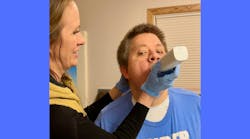Dental professionals can create an environment to empower those with disabilities
Caring for people with disabilities is deeply personal for me. My younger brother, Carter, has developmental disabilities. Our family's journey has been shaped by Carter's resilience and our support for him. This has profoundly influenced my dedication to creating inclusive environments where everyone, regardless of ability, can feel valued and respected. Our experiences have fueled my advocacy for compassion and dignity in my work to ensure that everyone receives the care and support they deserve, especially those with disabilities.
Working with people with disabilities creates some unique challenges and opportunities for caregivers and dental health-care professionals. They must balance providing the best care possible while working with each person’s unique personality, capabilities, and needs. We have the opportunity to empower those with disabilities through our respectful care.
There are three critical aspects to remember to achieve this balance of care and respect: recognize the inherent humanity and diversity of people with disabilities, employ behavior management strategies, and emphasize home care education, reassessment, and prevention.
Recognize humanity and diversity
Understand that people with disabilities are just that—people. They have the same emotions, desires, and needs as everyone else. The idea that extra education or certification is required to treat them perpetuates a myth of otherness that can be alienating and damaging. What’s needed is a shift in perspective. Health-care providers and caregivers must approach their work with empathy to understand the unique life experiences and challenges each person with disabilities faces.
What works for one person may not work for another, and they will react differently to various techniques. This diversity requires a personalized approach to care that respects the individual’s autonomy and preferences. Focus on the person rather than the disability, and foster an inclusive, respectful, and effective care environment.
Employ behavior management strategies
Many patients, parents, and caregivers prefer behavioral management rather than relying on medication or physical interventions. Behavioral management means understanding and addressing the behaviors and needs. It requires creativity and critical thinking to engage the patient’s abilities and preferences. It may require more effort on the part of health-care workers and caregivers, but it’s rewarded by empowering the patient and allowing them to manage challenges.
For instance, establishing a routine may provide a sense of stability and predictability for someone with a disability, thereby reducing anxiety and making it easier for them to navigate their daily life. The best results occur when positive reinforcement is used to encourage desirable behaviors, and clear, consistent communication clarifies expectations and boundaries. These strategies require understanding the individual’s needs and how to best establish a new routine for them.
Emphasize home care education, reassessment, and prevention
The importance of home care education, reassessment, and prevention cannot be overstated. For many with disabilities, home is where they receive most of their care. Give patients and their families the knowledge and strategies needed for effective home care. Educate them on how to perform daily tasks, recognize signs of potential health issues, and implement preventive measures to avoid complications.
Periodically reassess evolving health needs so that adjustments can be made in care plans. Regular check-ins and evaluations of the plan’s success ensure that care is responsive to the person’s needs and circumstances and addresses any changes.
Finally, prevention plays a key role in maintaining health and well-being. This may range from dietary restrictions or recommendations to exercises designed to prevent secondary conditions. By focusing on prevention, health-care professionals and caregivers can help individuals with disabilities lead healthier and more fulfilling lives.
Sources to help caregivers
Some organizations offer specialized tools and individualized care. Incorporating tools such as electric toothbrushes can greatly improve oral hygiene for people with disabilities. The Samba toothbrush from Curaden revolutionizes home dental care. With its unique design, it requires minimal movement from the patient, making it easier and more efficient. In just 60 seconds, it provides thorough cleaning that’s convenient and effective.
Education is the cornerstone to care and promotes independence and confidence in managing and enhancing oral health. Caregivers must regularly reassess needs, create new adaptations for their patients, and evolve to ensure that support remains responsive and effective.
Integrating educational resources and adaptive strategies fosters a culture of improvement to enrich the lives of those in our care. By providing access to resources for caregivers, we can equip patients and families with the tools they need to thrive.
Two to explore are Delta Dental and McMillen Health.
Working with patients with disabilities requires a personalized approach that recognizes everyone’s dignity and diversity. Approach their care with kindness, respect, and understanding, and recognize their humanity rather than focusing on a need for special credentialing.
Listen to patients, get creative in your thinking, and work closely with patients and caregivers to find what works best for them. It's not about controlling behavior but understanding and engaging with empathy. In the complex network of caregiving, every connection is crucial.
To all dental providers, I encourage you to recognize your potential to treat patients with disabilities. Have faith in your abilities, for you possess the empathy and expertise to positively impact their lives.
Let's embark on this journey together, one step at a time, one heart at a time. Ultimately, it's not about disabilities or limitations—it's about the boundless potential of the human spirit. Together, with innovative solutions and compassionate care, we can illuminate a world where everyone shines bright, where everyone's voice is heard, and where everyone knows they belong.
Crystal Spring, BSDH, RDH, LAP, FADHA, grew up on the Fort Peck Reservation in Montana and has more than 25 years in hygiene. Her experience includes her own mobile dental hygiene business, nonprofit, mentorship program, grant writing, and interprofessional education. Crystal has spent the majority of her career working to improve oral health disparities in vulnerable populations. She has been an ADHA Trustee, ADHA/HuFriedy Master Clinician, 2019 Sunstar RDH Award of Distinction recipient, and a recipient of the Dimensions Six Dental Hygienists You Want To Know.










